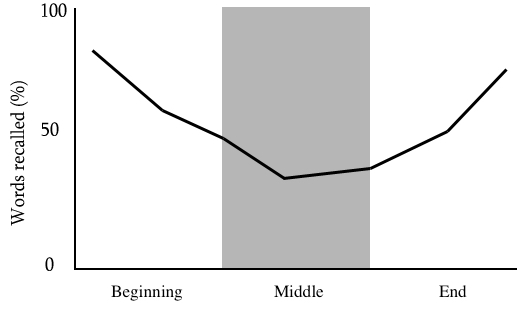
The end of the movie leaves a big impression.
When you give information, how much of it is typically remembered?
That is a complex question. It obviously depends a lot on tone and content, but it also depends on the order: what's first and last are most clearly remembered.
Studies have shown when given a list, most people remember the very beginning and the very end the best while the middle items are hazy and poorly remembered.
Psychologists call this the "primacy effect", meaning beginning, and the "recency effect", meaning the last thing that happened. Here is a graph of one study's findings:

In presentations
If you've given a presentation, which part did you spend the most time preparing for? There's a good chance you prepared for the middle—the slides and the story—without thinking exactly how you'd begin and end.
In your native language, maybe you can begin and end strongly without preparing. But can you do it in English?
If your audience most clearly remembers the first and last words you say, spend time making them excellent!
Giving opinions
This memory principle is important for a lot of other information, including strong answers in business meetings and speaking tests like the G.B.C. exam.
In a speaking test, too often students start slowly and end poorly. For instance, like this:
What's one thing you'd change about your company?
Umm... hmm. Ok. Well. I'd like to change, let me see, ok... one thing I'd like to change is the schedule for meetings. We spend too long in meetings, and to be honest, we waste time. If we were to stick to the agenda, that would be better. Furthermore, a time limit of perhaps thirty minutes would help us stay on track. So, um, yea, I guess that's what I'd change.
The problem is the high-quality part of the answer is in the middle, but according to the primacy and recency effect, that's the part that's least remembered. The beginning and ending of this answer are weak, and those are remembered most clearly!
The solution, obviously, is to spend time learning to begin and end strongly.
The English Farm has a lot of information here on the blog such as this post about how to begin arguments strongly and this post on how to end strongly. Furthermore, the Speaking Test Strategies course examines beginnings and endings—in lesson 2 on starting and finishing arguments and lesson 19 on high impact endings.
If you are an English Farm student, try some writing homework using the above-stated question "What's one thing you'd change about your company?" If you have any questions, ask your next instructor.
This last paragraph is probably going to be remembered more distinctly than the ones above. Simply put: we most clearly remember the beginning and endings, so make them memorable!
—
hazy [adjective]—unclear.